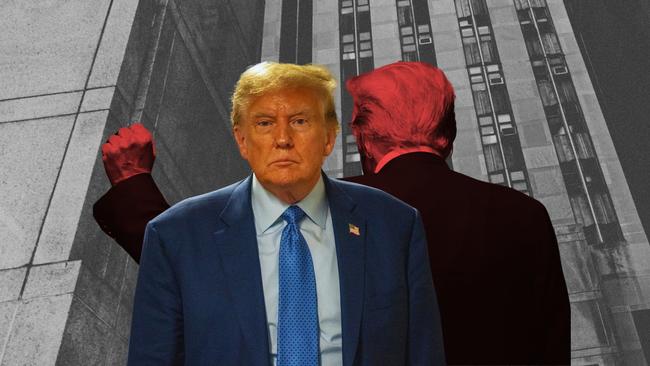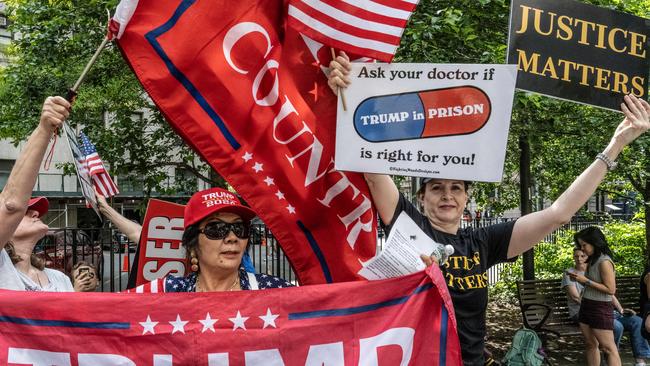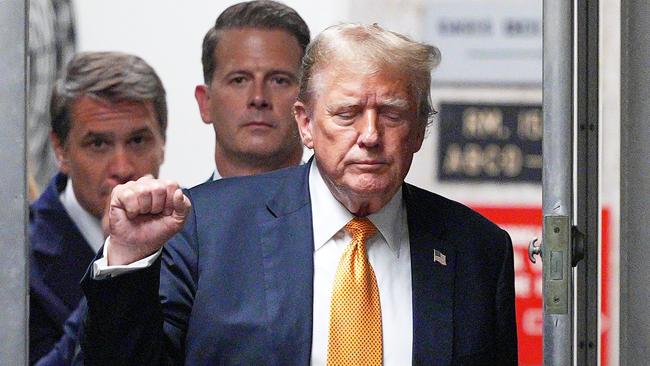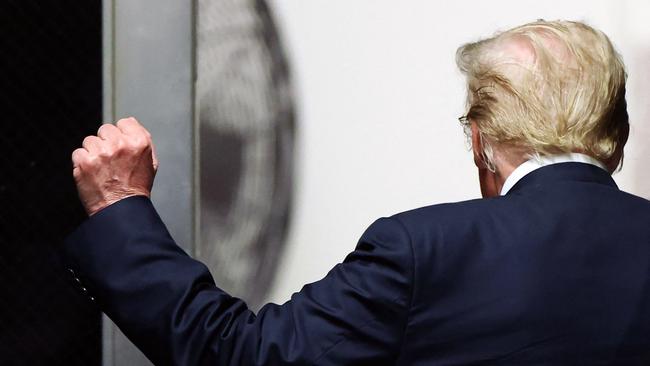Why is Donald Trump’s hush-money trial important and what happens if he’s found guilty
Jurors have begun their deliberations over Donald Trump’s historic hush money trial, which could see him with a hefty prison sentence if found guilty. What happens next.

Within hours, or perhaps days, Donald Trump could make history again, as the first former or current US president to be declared a convicted felon, with massive implications for US politics and the 2024 presidential election.
Twelve New York jurors, seven men and five women, began their deliberations Wednesday (Thursday AEST) in southern Manhattan over whether Trump made hush money payments to former adult film star Stormy Daniels as part of a conspiracy to influence the 2016 presidential election.
It’s not only the first criminal trial of a current or former US president: Trump is also the presumptive Republican nominee for president and around five months out from polling day, the favourite to win, according to most polls.
The charges against Trump
New York Democrat District Attorney Alvin Bragg indicted Trump in March last year on 34 charges of ‘falsifying business records in the first degree’, specifically, a violation of New York Penal Law 175.10.
“The defendant, in the County of New York and elsewhere … with intent to defraud and intent to commit another crime and aid and conceal the commission thereof, made and caused a false entry in the business records of an enterprise,” the indictment read, repeating that line 34 times, one for each allegedly dubious book keeping entry.

Is this just about hush money or something else?
What’s widely referred to as the ‘hush money’ trial, a reference to the US$130,000 payments Trump’s former lawyer Michael Cohen paid to Daniels in 2016, allegedly to buy her silence on behalf of Trump over an alleged sexual encounter with him in 2006, isn’t really about hush money, which is perfectly legal.
Indeed, the two-year statute of limitations for falsifying business records has well passed. To convict Trump, jurors must unanimously find him guilty of not only knowingly falsifying business records to obscure repayments he made to Cohen, but doing so for the express purpose of committing another crime, such as interfering with the 2016 presidential election.
It’s the intent to commit another crime, such as break federal or state campaign finance laws, that allowed prosecutors to ignore the statute of limitations and upgrade the charges to felonies.
Under US campaign finance laws, such a payment would be deemed a campaign contribution, requiring disclosure at the very least.
What happens if Trump is convicted?
If convicted, Trump, who turns 78 next month, could face up to four years in prison for each of the 34 charges, or 136 years jail. In reality, Judge Juan Merchan, who has presided over the trial since it began on April 15th, would have wide discretion over sentencing, which he would decide at a later date.
Jail time isn’t compulsory, and the judge could impose a probation sentence instead, requiring Trump periodically check in with authorities. It’s uncertain how Judge Merchan, whom Trump has repeatedly insulted as biased and corrupt, would rule.

Would a conviction harm Trump’s election hopes?
Politically, it’s not clear a conviction would hurt Trump, who has defied expectations by continuing to rise in national opinion polls throughout the trial, as he did following the series of indictments levelled at him last year.
When can we expect a verdict?
Experts have little clue how long the jury will take to reach a verdict, which could as early in the next few hours.
After around four hours of deliberation the jurors appeared to quash hopes of an early verdict, asking the judge four specific questions including to be reminded of testimony by former Trump lawyer Michael Cohen and National Enquirer David Pecker.
Soon after that they asked to re-hear the judge’s lengthy instructions, which fill 55 pages in print, from earlier in the day.
Whose case is strongest – Defence or Prosecution?
Even the president’s detractors concede this is an extraordinarily complex trial, resting on obscure interpretation of existing law, even setting aside the fact the prosecution’s star witness, Cohen is a convicted fraudster who loathes his former boss – even revealing under cross examination he had stolen $30,000 from him.
Trump’s top lawyer, Todd Blanche, memorably dubbed him the GLOAT in closing arguments: the Greatest Liar of All Time.

In the defence’s favour, no direct evidence Trump himself knew about the hush money payments, let alone that he had the intention to subvert campaign finance laws, was presented during the trial. Cohen told the court that Trump was made fully aware in an October 2016 phone call.
Most of the experts paraded by the major US networks say the evidence isn’t strong enough to convict beyond reasonable doubt, the relevant legal threshold.
In the prosecution’s favour, the 12 jurors, including two lawyers, a teacher and investment banker, have been drawn from Manhattan, which overwhelmingly (around 85 per cent) voted for Joe Biden in 2020.
What’s the best option for Trump?
An acquittal, or even a hung jury, which would require only one obstinate juror, would give the former president a burst of political momentum, leaving prosecutors with the embarrassing choice of whether to seek another trial, which would not begin for months.
Trump, who has furiously denied all the accusations including the affair with Daniels, would almost certainly appeal any conviction.
“On these instructions, the jury could well convict or deadlock. Trump will have a number of issues to raise on appeal if he’s convicted, and that likely won’t be resolved until after the election,” University of Los Angeles law professor Rick Hasen told The Australian.
The trial was the culmination of the first of four criminal indictments levelled at the former president last year.
The three others, related to allegations Trump tried to subvert the 2020 election and handling of classified documents, brought by state and federal prosecutors, are unlikely to reach trial this year, after successful moves by Trump’s legal team to induce the Supreme Court to first mull over the question of presidential immunity.






To join the conversation, please log in. Don't have an account? Register
Join the conversation, you are commenting as Logout